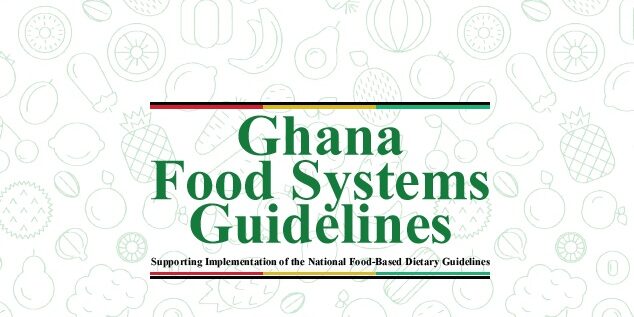The Ghana Food Systems Guidelines is a strategic national document developed to complement the National Food-Based Dietary Guidelines (FBDGs). While the FBDGs focus on individual dietary practices for healthier lives, the Food Systems Guidelines extend the approach by outlining system-level actions needed to create an enabling environment for those diets to be achievable.
Content Overview
The document contains:
-
Background and rationale: Explains the evidence base and multi-sectoral process that informed its development.
-
13 key recommendations: Aligned with the FBDGs, each recommendation addresses a critical area of diet and food systems—ranging from dietary diversity, fruit and vegetable intake, legumes, and animal-source foods, to safe food handling, physical activity, and limiting alcohol use.
-
Actionable strategies: Each recommendation includes a menu of policy, programmatic, and institutional actions that government agencies, civil society, the private sector, and local authorities can adopt.
-
Implementation framework: Provides guidance on how stakeholders at national, regional, and community levels can collaborate to promote healthier food environments.
Relevance to Nutrition and Health
The guidelines are highly relevant to Ghana’s public health priorities:
-
They promote dietary diversity and nutrient adequacy, addressing both undernutrition and the rising burden of obesity and non-communicable diseases (NCDs).
-
They highlight actions to ensure food safety, reduced food loss and waste, and improved access to safe water, which are essential for reducing diet-related health risks.
-
They reinforce the importance of nutrition education and school-based initiatives, supporting long-term behavior change.
Relevance to Policy Formation
The Food Systems Guidelines serve as a policy tool by:
-
Identifying legislative and regulatory gaps that hinder healthy food environments.
-
Providing a framework for multi-sectoral collaboration between agriculture, health, education, trade, and social protection sectors.
-
Offering evidence-based options for fiscal policies, subsidies, food labeling, and marketing regulation to protect public health.
Relevance to Intervention Planning
For program implementers and planners, the document:
-
Serves as a practical reference for designing nutrition-sensitive interventions that align with national priorities.
-
Supports monitoring and evaluation by linking actions to measurable food and nutrition outcomes.
-
Ensures that interventions are inclusive, with attention to vulnerable groups such as children, adolescent girls, and women of reproductive age.
To access this document click here
Conclusion
The Ghana Food Systems Guidelines bridge the gap between dietary advice and the broader systems that shape food choices. By providing clear, actionable strategies, the document strengthens the foundation for healthier diets, effective nutrition policies, and impactful interventions. Its availability on FANIS makes it more accessible to policymakers, researchers, NGOs, and community actors committed to improving nutrition and health in Ghana.
See Also




